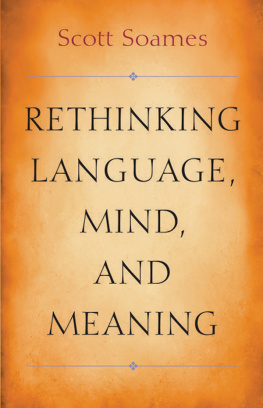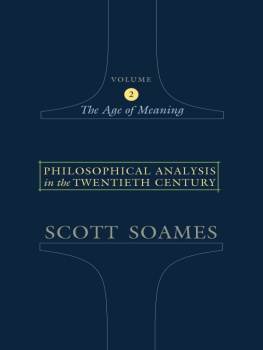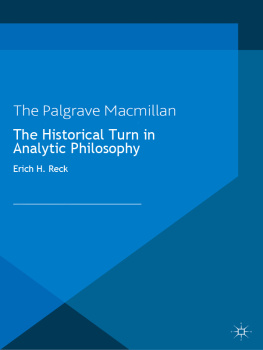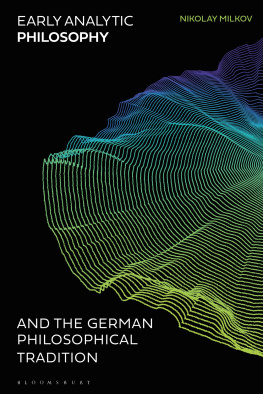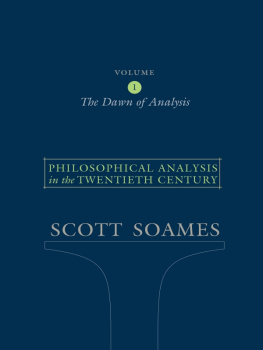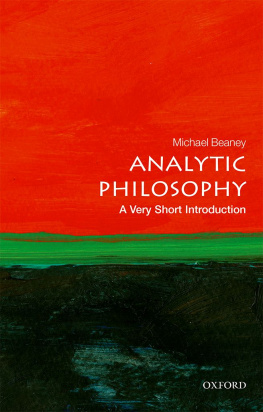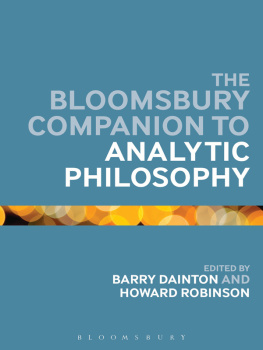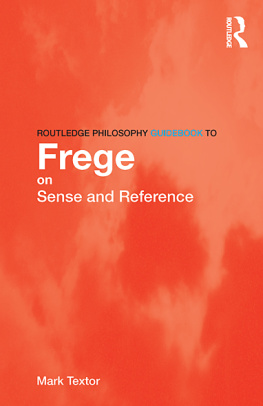
The Analytic Tradition in Philosophy

The Analytic Tradition in Philosophy

VOLUME 1
THE FOUNDING GIANTS
SCOTT SOAMES
PRINCETON UNIVERSITY PRESS
PRINCETON AND OXFORD
Copyright 2014 by Princeton University Press
Published by Princeton University Press, 41 William Street,
Princeton, New Jersey 08540
In the United Kingdom: Princeton University Press, 6 Oxford Street,
Woodstock, Oxfordshire OX20 1TW
press.princeton.edu
All Rights Reserved
ISBN 978-0-691-16002-3
British Library Cataloging-in-Publication Data is available
This book has been composed in Baskerville 10 Pro and John Sans
Printed on acid-free paper.
Printed in the United States of America
10 9 8 7 6 5 4 3 2 1
FOR MARTHA, BRIAN, AND GREG

CONTENTS

ACKNOWLEDGMENTS

I am grateful to my colleague, Gabriel Uzquiano, for reading and making many helpful comments on . Thanks also to my former disseration students Geoff Georgi and Brian Bowman for spotting many errors in their reading of the entire manuscript. Special credit goes to the two referees provided by the Princeton University Press, whose extraordinary insight and erudition greatly improved the manuscript, not least of which by identifying important omissions and pointing me in directions that allowed me to correct them in some cases and compensate for them in others. I also appreciate the useful feedback from the graduate students in Philosophy 500 at USC in the fall semesters of 2011 and 2012.
PREFACE

T his is the first of a new multivolume work on the analytic tradition in philosophy in which I plan to discuss major milestones in the subject extending from the late nineteenth century to the end of the twentieth century. Naturally, not all important pieces of the enormous volume of work done in this period will find their way into these volumes. However, my aim is to include a great deal. All the topics treated in the two volumes of my earlier work Philosophical Analysis in the Twentieth Century will be discussed here, plus much more. The issues presented will be pursued at greater length, in more detail, and, I hope, at a higher level of philosophical sophistication. Whereas the previous volumes grew out of lectures at Princeton intended for advanced undergraduates and beginning graduate students, these volumes will be more demanding.
The goal is to tell a coherent (though complicated) story of where the tradition has been, and where it appears to be heading. As before, this requires identifying major insights and achievements, and distinguishing them from major errors or disappointments. Although I have more space to devote to historical influence and context, my chief focus will continue to be on the explication and evaluation of argumentslots of them. Inevitably, some discussions will be contentious. Philosophical histories of the sort I am attempting to write are also works of philosophy. In my case, this means arguing with the greats in the process of learning from them. Make no mistake; the real philosophical progress that has occurred since the early days of the analytic tradition has put us in a better position to discern the errors and limitations to which even our greatest forebears were prone. However, it has not exhausted the rich store of insights to be gleaned from their work and from which we may hope to make still more progress. Those who did so much to make us who we are, are still our contemporaries in what amounts to a common quest.
This first volume covers the initial phase of the analytic tradition, prior to the English publication of Wittgensteins Tractatus Logico-Philosophicus in 1922. My discussion focuses on the period from Freges Begriffsschrift in 1879 through Russells The Philosophy of Logical Atomism in 1918. In addition to works that appeared within this time frame, I also discuss Moores 1925 A Defense of Common Sense, and his 1939 Proof of an External Worldboth of which articulated positions for which he was already well known prior to the publication of the Tractatus. The major milestones of this first phase of analytic philosophy on which I concentrate are:
(i) | the extraordinary development of symbolic logic pioneered by Frege and Russell; |
(ii) | their ground-breaking transformation of the philosophy of mathematics; |
(iii) | the use of the concepts and methods developed in their logico-mathematical investigations to lay the foundations for systematic investigations of language; |
(iv) | Russells relentless attempts, between 1905 and 1918, to use his method of logical and linguistic analysis to attack traditional problems of epistemology and metaphysics, and to establish such analysis as the chief methodological tool by which philosophy advances; |
(v) | the revolt of Moore and Russell against the systems of Kantian- and Hegelian- inspired Idealism that dominated British philosophy at the end of the nineteenth and the beginning of the twentieth century, as well as their resistance to the American Pragmatism of their time; |
(vi) | Moores agenda-setting metaethical views that framed debate in the subject for nearly half a century; and |
(vii) | Moores vigorous commonsense priorities in epistemology, the effects of which continue to influence philosophy down to the present day. |
By the end of this initial analytic period, logic, language, and mathematics had become central topics of philosophical inquiry in a way never before seen. But although logic and language were increasingly viewed as important for broad areas of philosophy, they did not yet define it. The three great philosophers of this period did not hold revolutionary views about the nature of philosophy itself. Although Frege differed sharply with Kant about logic, arithmetic, and the analytic-synthetic distinction, he had great respect for Kants view of the synthetic apriority of geometry and much of the Kantian conception of mind that went with it. Moores view of the nature of philosophywhich he makes clear in his 191011 lectures later published as Some Main Problems of Philosophywere traditional; philosophys job was to tell us what kinds of things there are, how they are related to one another, what we can know, how knowledge is achieved, and what is of greatest intrinsic value. What Moore added to this familiar picture was a way of proceeding that led to principled skepticism about the power of philosophy to establish highly revisionary views about any of these things. Russell was more ambitious. He too wished to provide answers to ancient questions about the nature of reality and our ability to know it. However, far from being skeptical about the possibility of arriving at novel and far-reading answers, he believed that the powerful methods of logical and linguistic analysis could be used to establish a stunningly revisionary epistemological and metaphysical system rivaling the great philosophical systems of the past.
Next page

